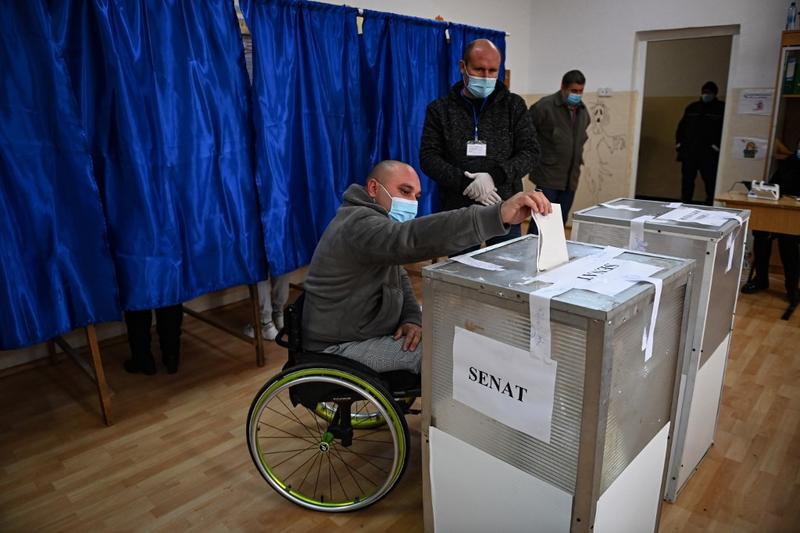 A man in a wheelchair casts his ballot at a polling station in Sintesti village, southern Romania, during the parliamentary elections on Dec 6, 2020. (DANIEL MIHAILESCU / AFP)
A man in a wheelchair casts his ballot at a polling station in Sintesti village, southern Romania, during the parliamentary elections on Dec 6, 2020. (DANIEL MIHAILESCU / AFP)
Romania’s ruling party remains confident of leading the next government, despite coming a surprise second in elections on Sunday that were dominated by the COVID-19 pandemic.
Prime Minister Ludovic Orban’s governing Liberal Party took power as the virus emerged in 2019
With the coronavirus pulling turnout down to the lowest since communism collapsed, it was the opposition Social Democrats who proved most effective at mobilizing their supporters, garnering 30 percent of the votes with 90 percent counted.
Prime Minister Ludovic Orban’s governing Liberal Party, which took power as the virus emerged in 2019 and has since seen more than 12,000 Romanians lose their lives amid the worst economic slump in three decades, got 25 percent. The newly formed Save Romania Union, a likely coalition partner for the Liberals, won 14 percent.
ALSO READ: Fiscal reform, corruption in focus in Romania parliamentary election
“I’m confident in the party’s capacity to build a majority together with Romania’s other democratic and pro-European forces,” Orban said. “Even if many people decided not to vote in these elections, we’ll come up with solutions for everyone’s problems.”
The outcome is important for the European Union. Orban has steered the country of 20 million people away from the course plotted by his Social Democrat predecessors, who’d flirted with the policies that set Hungary and Poland on a collision course with Brussels, most recently over the bloc’s budget and virus-rescue fund.
“Romanians have showed there’s need for a change,” Social Democrat leader Marcel Ciolacu said, criticizing the lockdowns Orban implemented to stem the spread of the coronavirus.
But his party is likely to struggle for coalition allies, while President Klaus Iohannis - who must nominate the next prime minister - openly favors the Liberals.
Coalition partners
Despite that backing, Orban’s goal to turn his current minority administration into a sturdier majority one in the EU’s most politically volatile member state has suffered a setback, with his party seeing its poll lead evaporate.
Strong leadership is essential: Romania’s investment-grade credit rating is on the line, while the ballooning budget deficit that Orban inherited has only worsened because of the virus. The Save Romania Union signaled it could be part of an alliance.
“This result shows that no reforms can be done in Romania without our party,” said its leader, Dan Barna.
READ MORE: Romania's Klaus Iohannis wins 2nd term in runoff
But the unexpectedly poor showing for Orban, who also wants to end the health crisis and overhaul the judiciary and public administration, means his hopes could hinge on finding more coalition allies. Five parties, in total, are set to enter parliament, the other two being the Ethnic Hungarians and a new anti-EU group that scored a surprisingly high 8 percent.


